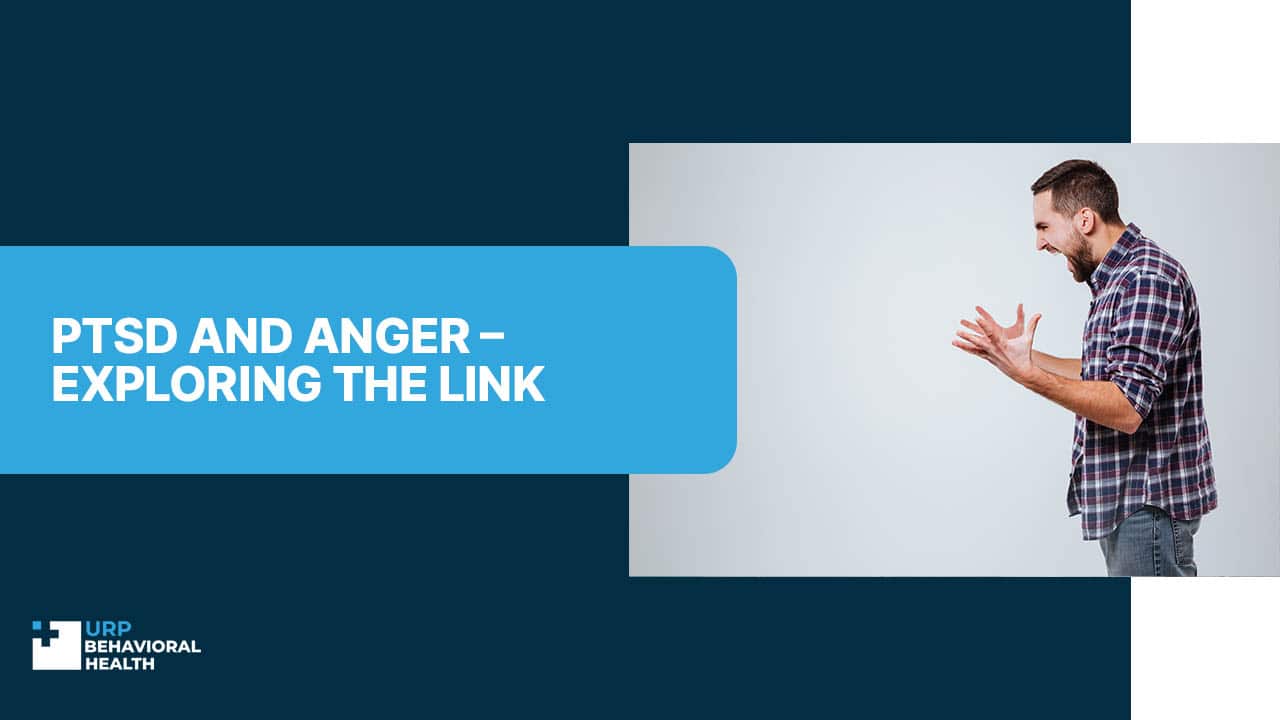
PTSD and Anger – Exploring the Link
Traumatic events in life such as violence, terrorist attacks, war, and natural disasters can cause a complex mental disease known as PTSD which stands for post-traumatic stress disorder. There are many symptoms of PTSD such as sleep disorders, anxiety, depression, hallucinations, memory loss, and anger. Understanding the connection between PTS disorder and emerging outbursts of anger is crucial for those who are struggling with it, as it usually impacts their lives by complicating symptoms and hindering the path to recovery. In this article, we are going to go deep into the reasons, types, and signs of anger associated with PTSD, and explore some effective strategies for managing and reducing anger in people with this disorder.
What is important to know and understand, is that post-traumatic stress disorder affects not only people with consequences of trauma but also their families, relatives, and friends. Anger caused by PTSD leads to broken relationships, quarrels, grievances, job loss, etc. Healing this symptom is all about restoring balance and enabling individuals to live fulfilling lives. Thanks to therapy and creating a supportive environment, those struggling with PTSD and anger as a consequence can find an efficient and fast way to recover and normal life.
We’ll help you understand your options and guide you toward care.
Does PTSD Cause Anger?
Yes, post-traumatic stress disorder can indeed cause anger as it often causes many emotional and behavioral symptoms that are difficult to control.
Why is this happening? There are several factors causing anger, including:
- Hyperarousal. PTSD often leads people to a heightened state of arousal, when an individual is easily startled and constantly on edge. This state, in turn, decreases an ability to control anger and other emotions.
- Re-experiencing Trauma. As we explored before, many PTSD symptoms lead to re-experiencing trauma such as flashbacks and intrusive memories of the traumatic event. This re-experiencing can be extremely difficult for those with PTSD and causes outbursts of anger.
- Avoidance and Isolation. People with PTSD tend to try to avoid re-experiencing the trauma and any memories of it. This makes them feel disconnected and misunderstood. The lack of social support and understanding can cause feelings of loneliness and also provoke outbursts of anger.
The Link Between PTSD and Anger
The link between post-traumatic stress disorder and anger is well-known and confirmed by the latest research. But why does this link even exist? Let’s explore.
There are several reasons explaining this link:
- Neurobiological Factors. PTSD causes serious changes in brain structure which affects emotional regulation and makes maintaining and controlling emotions hard for people with the disorder. The main point is that the amygdala, responsible for processing emotions, becomes overactive, while the prefrontal cortex, which regulates impulses, becomes underactive.
- Psychological Factors. Experiencing trauma often leads to the appearance of a defense mechanism based on feelings of helplessness, betrayal, and injustice. In turn, the defense mechanism subconsciously causes anger as a response to it.
- Behavioral Factors. The defense mechanism creates a vicious circle of anger when a person is subconsciously trying to defend themselves because of unresolved trauma. Anger leads to conflicts, which, in turn, causes even more anger and makes this vicious circle hard to break.
Signs of Anger in PTSD
Recognizing and understanding the signs of anger caused by PTSD is vital for early intervention and efficient treatment. Here are several signs of it:
- Frequent Irritability. Manifests itself in constant irritability with no reason and a low-stress tolerance.
- Explosive Outbursts. Manifests itself in unpredictable and intense outbursts of anger which causes suffering of those with PTSD and their family and friends.
- Physical Aggression. Manifests itself in an uncontrolled and sudden desire to engage in physical altercations including hitting, throwing objects, or self-harm.
- Verbal Aggression. Manifests itself in using harsh and offending language or even threats. Verbal aggression leads people with PTSD to isolation and misunderstanding.
- Withdrawal. Manifests itself in cases when a person self-isolates at their request to avoid all of the above-mentioned anger issues, which ultimately leads to a worsening of the condition and a feeling of loneliness.
Our team will verify your insurance and design a plan tailored to your needs.
Types of Anger in PTSD
There are several types and forms of anger in PTSD, and each has unique characteristics:
- Reactive Anger. Reactive anger is characterized by unpredictable and intense outbursts of anger, which can be difficult or even impossible to control. This type of anger often leads to events that people later regret.
- Suppressive Anger. Suppressive anger includes passive-aggressive behaviors or even self-harm. Suppressed anger can cause other disorders such as depression and also leads to the appearance of negative physical symptoms such as headaches or stomach issues.
- Chronic Anger. Chronic anger is a constant feeling of anger. This type affects the daily routine of people with PTSD and leads to long-term stress and health problems.
How to Handle PTSD or C-PTSD Anger Attacks
Treatment of anger attacks in post-traumatic stress disorder or complex post-traumatic stress disorder includes a variety of approaches such as:
- Identify Triggers. One approach includes recognizing thoughts and situations that can easily trigger anger and working with them. One of the ideas is creating and filling a journal with such triggers and responses to them.
- Mindfulness and Relaxation Techniques. Another way of treatment includes a variety of mindfulness and relaxation such as deep breathing, meditation, and progressive muscle relaxation, which help people to reduce stress and calm the mind.
- Cognitive Behavioral Therapy (CBT). This approach focuses on changing useless thought patterns and helps people to manage anger more easily.
- Communication Skills Training. One more approach is communication skills training. This strategy helps those with PTSD to train communicative and conflict resolution skills in order to improve their relationships with family, relatives, and friends.
- Support Networks. Another approach we are going to explore is called “Support Networks”. It is a great solution, the main point of which is to create a safe and comfortable space for people with PTSD to share and discuss feelings, which can speed up the recovery process.
- Trauma-Focused Therapy. Trauma-focused therapy is a practice that includes such treatments as EMDR which stands for Eye Movement Desensitization and Reprocessing, and Prolonged Exposure Therapy. These treatments help to reduce trauma-related anger.
- Physical Exercise. Regular exercising is no less important for patients with PTSD than other therapy methods. It’s well known that physical exercises lead to reducing stress and improving overall health.
- Art and Music Therapy. Such creative therapies help people express negative emotions, which, in turn, reduces anger. Art and music therapy can include practices like playing an instrument, writing, or drawing.
Conclusion
Exploring and understanding the link between post-traumatic stress disorder and anger is crucial for creating efficient plans of treatment. This includes recognizing the signs, and deeper roots of the problem and making successful strategies in order to help patients with PTSD to control their anger and improve the overall quality of their lives.
If you, or someone you know are struggling with PTSD and anger it’s vital to seek professional help, such as from the URP Behavioral Health, as it can help in providing support and curing, speeding up the recovery. This help includes emotional, psychological, and physical support.
Besides, quickly involving and identifying the problem can prevent the escalation of worse symptoms. No less important in this case is creating a supportive, friendly, and comfortable atmosphere and educational part of the problem.
Combining professional help, a supportive environment, education in this field, and efficient treatment plans helps those suffering from PTSD find a way to heal and come back to normal and happy life.
Don’t wait - confidential help is available right now for you or your loved one.
Sources
- National Center for PTSD. (n.d.). Anger and Trauma. Retrieved from https://www.ptsd.va.gov/understand/related/anger.asp
- (2024). PTSD and Anger: Understanding the Link. Retrieved from https://healthmatch.io/ptsd/ptsd-and-anger
- McHugh, T., et al. (2018). The Neurobiological Basis of PTSD Anger. Journal of Neuropsychiatry and Clinical Neurosciences, 30(3), 188-195. Retrieved from https://psychiatryonline.org/doi/10.1176/appi.neuropsych.18050109
- Chemtob, C.M., Novaco, R.W., Hamada, R.S., Gross, D.M. (2017). Anger and PTSD: Cognitive-Behavioral Approaches. Current Treatment Options in Psychiatry, 4(3), 175-187. Retrieved from https://pubmed.ncbi.nlm.nih.gov/28813322/
- Taft, C.T., et al. (2015). Anger, Aggression, and PTSD in Trauma-Exposed Adults: The Role of Trauma Type. PTSD Research Quarterly, 26(2), 1-10. Retrieved from https://pmc.ncbi.nlm.nih.gov/articles/PMC4100723/
















